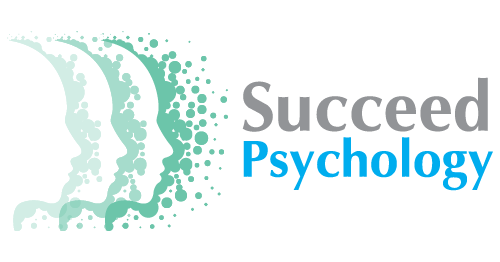Succeed Psychology provides expert psychology services for adults, adolescents and children.
Services include assessments, reports, and psychological therapy.
Areas of Focus
Anxiety; ADHD; Assertiveness Training; Bipolar disorder; Depression; Eating disorders; Obsessive-Compulsive Disorder (OCD); Panic Attacks; Personality disorders; Addiction Disorders; Post-Natal Depression; Post-Traumatic Stress Disorder (PTSD); Self-Harm; Sexual Abuse and Complex Trauma.
Cognitive Behaviour TherapY
CBT works by teaching a person to alter their maladaptive thoughts (cognition) and behaviours. The aim is to become aware of negative thoughts about ones self, relationships, and the world around them. Once we are aware, we are able to challenge the validity and utility of these thoughts and replace them with more constructive thoughts and behaviours.
Through CBT you will learn coping skills and techniques to resolve the core concerns but also to be successful in every-day life. You will learn how to avoid ‘holding patterns’ or maintaining factors. CBT is founded on the premise that knowledge is power- through learning about your condition you will develop skills to recognise and manage these maladaptive patterns. Research has demonstrated CBT to be effective for many mental health conditions, particularly in depression and anxiety.
EMDR
EMDR, or Eye Movement Desensitization and Reprocessing, is a therapeutic technique designed to help individuals cope with distressing memories, traumatic experiences, and emotional difficulties. It is an evidence-based therapy that aims to alleviate the distress associated with traumatic memories and foster psychological healing.
EMDR may be beneficial if you:
Struggle with symptoms of PTSD, anxiety, or depression
Feel stuck or overwhelmed by certain memories or emotions
Seek a therapy approach that is evidence-based and structured
Have experienced traumatic events or distressing memories
Virtual reality technology assisted therapy
More than three decades of controlled studies have proven the benefits of Virtual Reality technology in mental health counselling. Virtual Reality (VR) technology can aid in the treatment of phobias, general anxiety, attention training and mindfulness. VR technology allows your psychologist to teach you valuable anxiety management techniques in the safety of our therapy rooms, while allowing you to gradually habituate to your fear presented virtually. VR allows us to personally control and calibrate the right setting to challenge your anxiety and allow for graded exposure.
Schema Therapy
Schema Therapy is an integrative approach to treatment that combines aspects of cognitive-behavioral, experiential, interpersonal and psychoanalytic therapies into one unified model. Schema Therapy has shown remarkable results in helping people to change negative patterns which they have lived with for a long time, even when other methods have been unsuccessful. The schemas targeted in treatment are enduring and self-defeating patterns that typically begin early in life. They may relate to negative thoughts, feelings, behaviours or relationship patterns. Schemas can get in the way of us reaching goals and living our values. These schemas are perpetuated behaviourally through maladaptive coping responses. Schema therapy treatment helps to break these negative patterns of thinking, feeling and behaving, and to develop healthier alternatives to replace them.
Acceptance and Commitment Therapy
Acceptance and commitment therapy is an empirically-based psychological intervention that uses acceptance and mindfulness. The objective of ACT is not to eliminate difficult feelings or situations- as some can not easily be changed-but to be present with what life brings us and to live our values regardless. Acceptance and commitment therapy invites people to tolerate unpleasant feelings, learning how to live your best life taking problems in your stride. Through ACT, people learn to do what works while committing to their valued path.
Dialectical Behaviour Therapy
The term ‘dialectical’ means ‘working with opposites’. DBT uses seemingly opposing strategies of ‘acceptance’ and ‘change’. The therapist accepts you just as you are and teaches you to accept yourself, but acknowledge the need for change to move forward and reach your personal goals.
DBT uses skills such as mindfulness to focus your awareness on the present moment, and to acknowledge and accept your thoughts, feelings, behaviours and bodily sensations as they occur.
DBT teaches distress tolerance skills to learn how to manage and cope during a crisis, and to tolerate distress when it is difficult or impossible to change a situation.
There is a strong focus on emotional regulation to effectively manage your emotional experience, and not allow your emotions to manage you. Lastly, DBT uses interpersonal effectiveness to teach things like assertiveness and conflict resolution.






